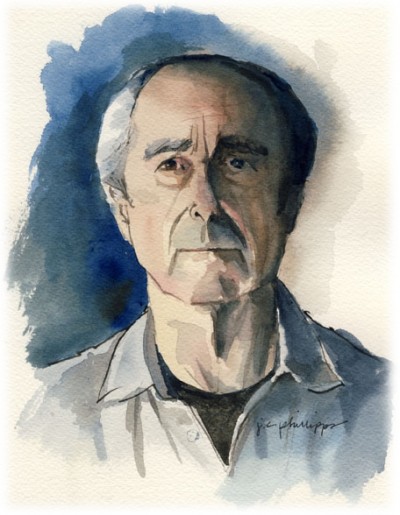But that was O.K., because I had already read it, years before, when I was still young and fresh and could hold a book in my hand and feel like it knew me. I still remember the feeling of it, one of those long Saturdays when the shadows fall in slow rectangles, and it seems like eternity will come and go before shabbas has ended. I sat on the oriental carpeted floors of my living room, stuck in that fateful moment of deciding how to spend the pre-sunset hours that were stretching before me. Portnoy’s Complaint was a fat paperback with a purple maroon cover. I decided to read it.
And I fell in love. A weird type of love though, one that was more painful than pretty. This is me, I thought. This is my struggle. I had never been to Newark New Jersey, but I didn’t need to.
For all the teachers and rabbis that stood before me, on a revolving repeat throughout my entire life, I felt as though I had never been talked to so honestly, so clearly. His ability to see and understand. The first time I had encountered someone who was so willing to stop and consider what it meant to be American and Jewish, to call out the fragility and superficial kindness of growing up between two worlds. I saw him as fearless.The stories were set in the mid-century, and though the scenery felt antiquated, the emotions did not. Seeing Jews as immigrants, understanding the insecurity at play, the identity politics, the hold to empty traditions, that teological need to always be better than the generation before. The sacrificial air of parents that gave up everything for the children that didn’t necessarily understand what the purpose of it all was.
And that is the beginning of my Philip Roth story.
I’ve continued to dabble in Roth, usually over winter breaks when the outside air is bitingly cold and I have little else to do. I read Human Stain, American Pastoral, Goodbye Columbus. He and I both got more complicated as we aged. My relationship with Roth was never as pure as it had been that first time.
Some moments I loved him, others I couldn’t wait for him to shut up. Why does he feel the need to write in circles about every last fabricated detail? I hated him for making things up. When I neared the end of Human Stain, I couldn’t help but feel woefully deceived by his narrative pranks. I knew from then on that his goal was to fuck with me, to get me to trust his narrative voice and then to completely pull the rug out from under me. He wanted me vulnerable. He was laughing. I remember sitting in my bed, with the book lying in a heap on the floor, staring at the wall, feeling as though I had lost a friend. Been betrayed by a voice that had somehow, mercilessly, wormed its way inside of me to a place that I never should have let it go.
American Pastoral shook me in a different way. That daughter, so villainized by Roth, ugly and fat and hypocritical. I could feel his loathing for her seeping through the pages, and yet I couldn’t help but be caught up in the ethics that she was trying herself to understand. The hypocrisy between America the beautiful and America the savage. I understood his harshness, I felt it myself. And yet, I was alienated by his lack of compassion, his inability to love any of the characters that he was creating, and so I put him down, and, though it wasn’t intentional, never finished reading it.
That is the power of Philip Roth.
And now, apparently, Philip Roth has written his last book. Over 30 novels published in 53 years, but 2013 will see no more.
“Enough is enough!” Roth said in a quiet interview with Les Inrocks, a French publication. “I do not want to read, to write more.”
Jewcy.com reports that, at age 74, Roth decided to re-read his life’s work, in reverse chronological order, in order to see whether or not any of it was worth it.
“I wanted to see if I had wasted my time writing,” he said, of his decision to re-read over 30 of his novels. “And I thought it was rather successful. At the end of his life, the boxer Joe Louis said: “I did the best I could with what I had.” This is exactly what I would say of my work: I did the best I could with what I had. I no longer feel this fanaticism to write that I have experienced in my life.”
My initial instinct upon hearing this news was one of panic and sorrow. And than gratitude, as my prior literary lazyness means that I still have 27 books left to read.
![rothwatercolor1 Philip Roth declares that he has written his last book [CC: Rothsociety.org]](https://newvoices.org/wp-content/uploads/2012/11/rothwatercolor1.jpeg)

